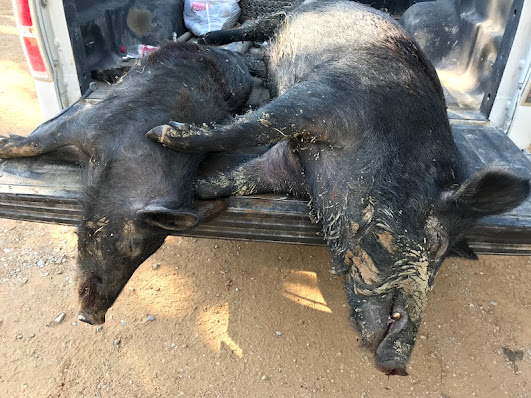Hunting with Respect: Landowner Relations and Etiquette in the Field - A Hog Hunter's Guide
Unlimited Hog hunting in Texas is an exhilarating adventure, offering a chance to test your skills, connect with nature, and contribute to wildlife management. However, a successful hunt goes beyond mastering tracking and stalking techniques. Building strong relationships with landowners is equally crucial. These individuals hold the key to accessing prime hunting grounds, and respecting their land and their wishes is paramount for a safe and ethical hunt.
Why Landowner Relations Matter
Texas boasts a rich tradition of private land ownership. Public hunting lands are limited, making permission from landowners essential for accessing prime hog hunting grounds. These individuals invest time, money, and resources into managing their land, and respecting their property is simply the right thing to do. Furthermore, fostering a positive relationship with a landowner can lead to repeat hunting opportunities and even invitations to participate in other hunting activities.
Building Trust and Establishing Communication
The foundation of a strong relationship with a landowner is built on open communication and mutual respect. Here are some key steps to take:
Make Initial Contact: Research the desired hunting area and identify the landowner. Contact them politely, explain your interest in hog hunting on their property, and inquire about the possibility of obtaining permission.
Be Upfront and Transparent: Be clear about your intentions, the type of hunting you plan to do (e.g., solo, group), and the expected duration of your hunt.
Offer Compensation: While not always mandatory, offering compensation can show your appreciation for the landowner's permission. This could be a monetary contribution, a share of the harvested meat, or offering to assist with land maintenance activities.
Respect Existing Practices: Inquire about any existing hunting regulations on the property. Some landowners may have specific rules regarding the types of game that can be hunted, bag limits, or preferred hunting methods (e.g., archery only).
Etiquette in the Field: Leaving a Positive Impression
Once permission is granted, your behavior in the field reflects not only on yourself but also on all hunters. Here's how to ensure a respectful and productive hunt:
Arrive Prepared: Show up on time and be prepared with all necessary licenses, permits, and hunting equipment. This demonstrates your seriousness and respect for the landowner's trust.
Leave No Trace: Pack out all your trash, including food scraps, empty cartridges, and any other items you brought in. Respect the natural environment and leave the land exactly how you found it.
Minimize Damage: Be mindful of property boundaries and avoid causing damage to fences, gates, or other structures. Use established trails whenever possible, and minimize your impact on the landscape.
Respect Wildlife: Hunt ethically, taking only mature and healthy animals within the agreed-upon limits. Always prioritize a clean shot to ensure a humane harvest.
Communicate Effectively: Maintain clear communication with the landowner throughout your hunt. Inform them of your arrival and departure, and keep them updated on your progress if requested.
Beyond the Basics: Building a Long-Term Partnership
Building a lasting relationship with a landowner goes beyond a single successful hunt. Here are some ways to solidify the bond:
Offer to Help: Volunteer your time to assist the landowner with tasks like clearing brush, repairing fences, or planting food plots. This demonstrates your appreciation and willingness to contribute to their land management efforts.
Provide Feedback: After your hunt, provide the landowner with feedback about your experience. Share any observations you made about hog activity or the overall health of the land.
Share the Harvest: If your hunt is successful, consider offering the landowner a portion of the harvested hog meat. This is a thoughtful gesture that shows your appreciation for their permission.
Stay Connected: Maintain communication with the landowner throughout the year. Send a thank-you note after your hunt, and inquire about future hunting opportunities or ways you can be of assistance.
.jpg)



Comments
Post a Comment